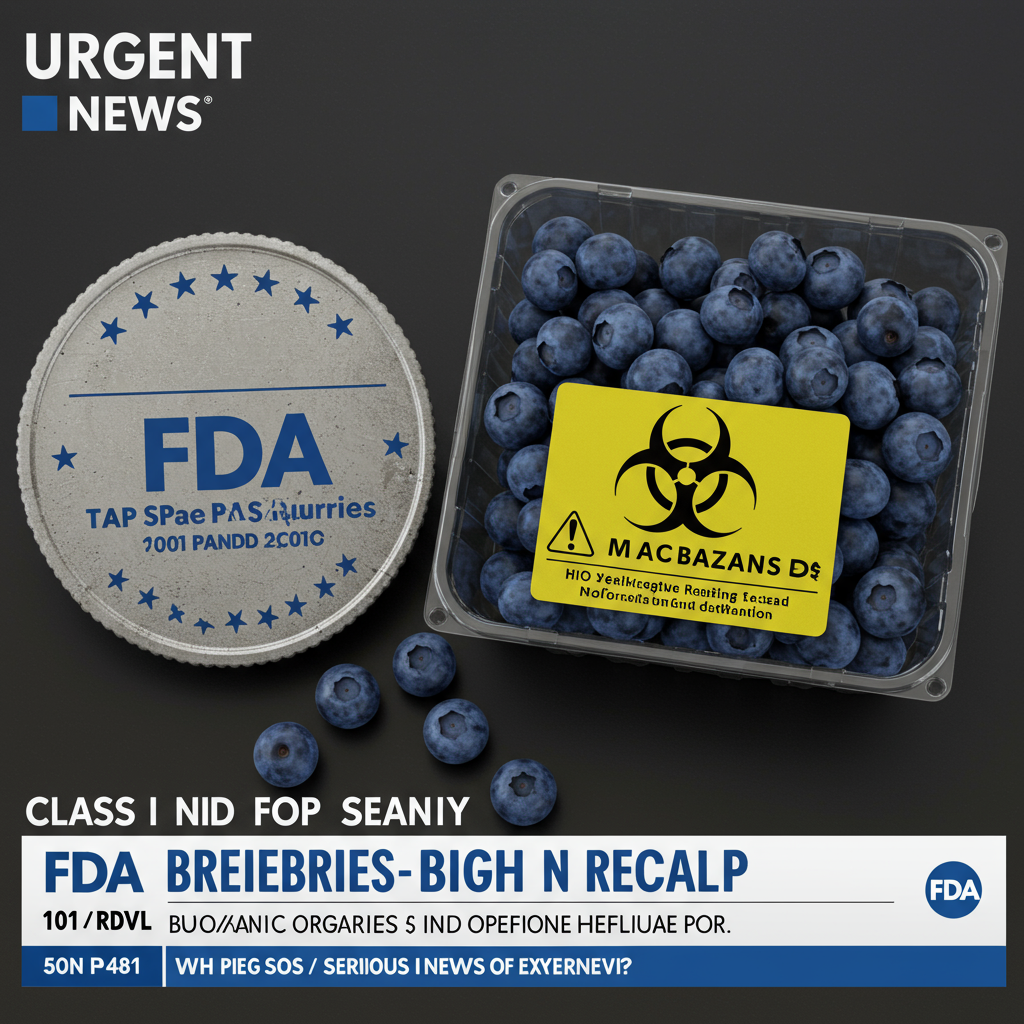An urgent health alert has been issued regarding a significant organic blueberry recall impacting certain bulk products due to potential listeria monocytogenes contamination. The U.S. Food and Drug Administration (FDA) has classified this action with its highest severity rating, a Class I recall. This indicates a serious health hazard where there is a reasonable probability that consuming the affected fruit could lead to severe adverse health consequences or even death. The recall involves a substantial quantity of blueberries, highlighting the importance of checking any bulk organic blueberries you may have recently acquired.
Urgent Recall Issued for Listeria-Contaminated Organic Blueberries
Approximately 12,000 pounds of organic blueberries are subject to this critical recall. The voluntary action was initiated by Alma Pak International, a company based in Georgia. This recall specifically targets bulk organic blueberries. It covers 400 boxes, with each box weighing 30 pounds.
The presence of Listeria monocytogenes bacteria triggered the recall. Routine testing conducted by Alma Pak International detected the pathogen. A finished product tested positive for the bacteria. The recall process began in June 2025. However, the FDA elevated the situation to a Class I recall on July 1, 2025. This action underscores the potential danger associated with the contamination.
Why This Blueberry Recall Received the Highest Risk Warning
The FDA uses a classification system for recalls. Class I is the most serious level. It means there is a high probability of severe health issues. These consequences could include serious illness or death. This contrasts with Class II (temporary health consequences likely) or Class III (unlikely to cause adverse health effects). The Class I designation for this organic blueberry recall signals a grave concern for public safety. The bacteria Listeria monocytogenes is known to cause severe foodborne illness.
The affected blueberries were shipped to a single customer. This customer is located in North Carolina. The company has identified specific lots involved. The lot codes are 13325 G1060 and 13325 G 1096. Checking these codes is crucial for anyone who purchased bulk organic blueberries from this supplier or distributor in the affected area.
Understanding the Danger of Listeria Infection (Listeriosis)
Listeria is a common type of bacteria found in the environment. It can contaminate various foods. An infection caused by this bacteria is called listeriosis. According to the Centers for Disease Control and Prevention (CDC), listeriosis is a serious foodborne illness. It is the third-leading cause of death from food poisoning in the United States. While healthy individuals might only experience mild symptoms, Listeria poses significant risks.
A notable characteristic of Listeria is its ability to grow. It can multiply even at refrigerated temperatures. This makes cold-stored foods particularly susceptible if contaminated. Foods like soft cheeses, deli meats, and unpasteurized dairy are sometimes associated with Listeria outbreaks. Contaminated produce like blueberries can also carry the risk.
Who is Most Vulnerable to Severe Listeria Illness?
Certain groups face a much higher risk. These individuals can develop severe, life-threatening infections. This high-risk category includes:
Pregnant women
Newborn babies
Older adults (aged 65 and above)
People with weakened immune systems
For pregnant women, listeriosis can lead to tragic outcomes. These include miscarriage, stillbirth, or premature delivery. The infection can also cause life-threatening issues for the newborn. In older adults and those with compromised immunity, the infection can spread. It can reach the bloodstream or nervous system. This can result in meningitis or sepsis. These severe forms of listeriosis can be fatal.
Recognizing Listeria Symptoms: What to Watch For
Symptoms of listeriosis can vary. They depend on the individual and the severity of the infection. Mild symptoms often resemble the flu or common foodborne illnesses. These can include:
Fever
Muscle aches
Fatigue
Nausea
Vomiting
Diarrhea
In more severe cases, especially when the infection spreads, symptoms become more serious. Watch for signs that indicate the bacteria has reached the nervous system. These include:
Headache
Stiff neck
Confusion
Loss of balance
Convulsions
Symptoms can appear relatively quickly. Sometimes they start the same day after eating contaminated food. However, they can also take much longer to develop. It might take up to 10 weeks for symptoms to manifest. If you are in a high-risk group and experience flu-like symptoms, especially within two months of consuming potentially contaminated food like the recalled blueberries, seek medical attention promptly. Listeriosis is treatable with antibiotics if caught early.
Listeria vs. E. coli: Key Differences
While both cause foodborne illness, Listeria and E. coli differ. Listeria contamination typically happens through ingesting contaminated food directly. E. coli is often spread differently. It usually occurs when feces contaminates food or water. This can happen due to poor hygiene or contact with animal waste.
Their symptoms also differ slightly. Listeriosis symptoms can start within hours or take weeks. E. coli symptoms typically appear 3-4 days after exposure. E. coli is known for causing severe stomach cramps and often bloody diarrhea. While diarrhea can occur with Listeria, it’s not always present, and the severe form involves nervous system issues.
What to Do If You Have the Recalled Blueberries
Taking immediate action is crucial if you believe you might have the affected product.
Do NOT consume the recalled blueberries. This is the most important instruction. Do not eat them raw or cooked.
Check the lot codes. Locate the packaging or labeling for the bulk organic blueberries. Look for the lot numbers 13325 G1060 or 13325 G 1096. These specific codes identify the recalled product.
Do not open or smell the product. Harmful bacteria like Listeria are invisible. They have no smell or taste. Trying to inspect the fruit won’t tell you if it’s safe.
Dispose of the product safely. If you have the recalled blueberries, do not eat them. Do not donate them to food banks. Pets can also get food poisoning, so do not feed them to animals either. The safest approach is usually to discard them securely. Place them in a sealed bag before putting them in the trash. This prevents accidental consumption by humans or animals.
Consider returning the product. Check the official recall notice. It will provide specific instructions. Often, you can return the product to the place of purchase for a refund.
Wash your hands thoroughly. If you handled the suspected product or its packaging, wash your hands immediately. Use soap and warm water. Clean any surfaces the blueberries might have touched.
Monitor your health. If you consumed the recalled blueberries, especially if you are in a high-risk group, watch for symptoms. If symptoms develop, contact a healthcare provider right away. Inform them about the recall.
Alma Pak’s Response and Food Safety Measures
Following the positive test result, Alma Pak International initiated the voluntary recall. The company has stated it worked closely with regulatory bodies. These include the FDA and the Georgia Department of Agriculture. An independent food safety consultant was also involved. The company reported conducting a thorough investigation.
Alma Pak has also indicated that the affected product was fully recovered. They assert it did not reach retail markets. They claim no product was sold to consumers, eliminating risk to public health. The company implemented additional corrective actions. Preventive controls were also enhanced. These steps aim to strengthen their food safety systems. Subsequent testing showed negative results for Listeria monocytogenes. This suggests their measures were effective following the initial detection.
Food safety experts note that Listeria is widespread in the environment. Haley F. Oliver, a professor of food science, highlighted its presence in soil. Mary O’Riordan, a professor of microbiology, pointed out its unusual ability to grow under refrigeration. This makes controlling it in food production challenging but critical. The company’s “seek and destroy” efforts and increased testing demonstrate vigilance in this area.
Frequently Asked Questions
What symptoms should I watch for with Listeria from recalled blueberries?
Symptoms of Listeria infection, or listeriosis, can vary. Mild cases may feel like the flu, causing fever, muscle aches, fatigue, nausea, vomiting, or diarrhea. More severe cases, especially in vulnerable people, can involve headache, stiff neck, confusion, loss of balance, or convulsions, indicating the infection has spread. Symptoms can appear hours or up to 10 weeks after eating contaminated food.
Which specific organic blueberries are part of this FDA Class I recall?
This urgent recall applies to bulk organic blueberries from Alma Pak International in Georgia. The affected product is identified by specific lot numbers: 13325 G1060 and 13325 G 1096. The recall covers approximately 12,000 pounds, packaged as 400 boxes, each weighing 30 pounds. This product was shipped to a single customer in North Carolina.
If I bought these recalled organic blueberries, what steps should I take now?
Immediately check if your bulk organic blueberries match the recalled lot numbers (13325 G1060 or 13325 G 1096). If they match, do not eat them under any circumstances. Do not donate or feed them to pets. Safely dispose of the product, perhaps by double-bagging it before discarding, or return it to where you bought it as per the recall notice. Wash your hands and any surfaces that touched the berries. If you consumed the product and are in a high-risk group or develop symptoms, contact a healthcare provider immediately.
Conclusion: Staying Informed About Food Safety
This FDA Class I recall of organic blueberries contaminated with Listeria monocytogenes serves as a vital reminder. Food safety vigilance is paramount. While voluntary recalls and company testing demonstrate proactive measures, contamination risks exist within complex food supply chains. Consumers play a critical role in responding to these alerts. By checking product codes, understanding the potential health risks of pathogens like Listeria*, and following recall instructions, you can protect yourself and your family. Stay informed about food recalls by monitoring official sources like the FDA’s website (FoodSafety.gov). Prompt action based on these warnings can prevent serious illness and underscore the importance of rigorous food safety practices from farm to table.




